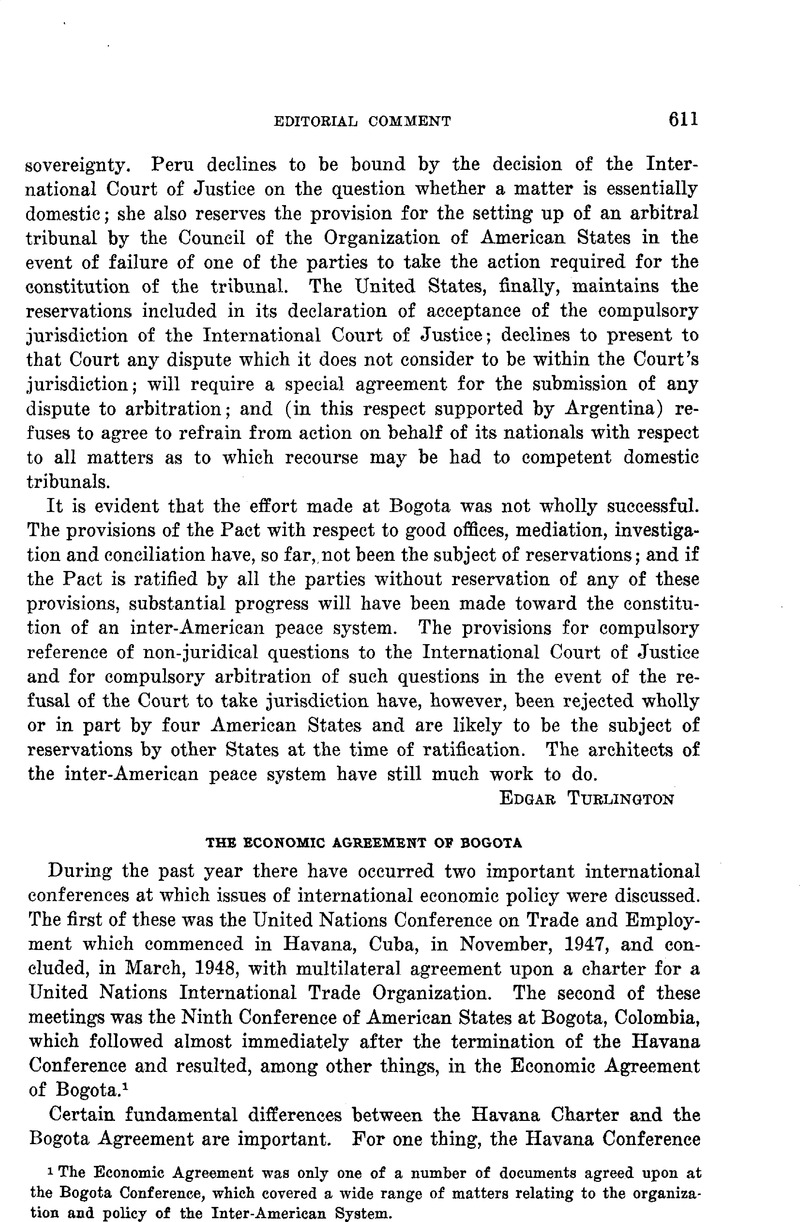No CrossRef data available.
Published online by Cambridge University Press: 20 April 2017

1 The Economic Agreement was only one of a number of documents agreed upon at the Bogota Conference, which covered a wide range of matters relating to the organization and policy of the Inter-Ameriean System.
2 This change in name is provided for by the Charter of the Organization of the American States signed at Bogota on April 30, 1948.
3 It was agreed at Bogota that there should be held in Buenos Aires a Special Economic Conference to be convened at the call of the Inter-American Economic and Social Council. It was contemplated that this conference would begin late this year.
4 Article 21. The conclusions of the Inter-American conference on problems of war and peace. Mexico City, 1945.
5 Public Law 63 of the 76th Congress (approved May 3, 1939)—53 U. S. Stat. 652 amending Public Law 545 of the 75th Congress—52 TJ. 8. Stat. 442.
6 The Inter-American Economic and Social Council has been advised by the Secretary General of the Organization that there will be available for this purpose under the current budget less than $200,000, which would seem far from adequate to accomplish the purposes set forth.
7 The International Bank, Section 3 of Article IV, provides, in sub-section (b), as follows: The Bank may, in exceptional circumstances when local currency required for the purposes of the loan cannot be raised by the borrower on reasonable terms, provide the borrower as part of the loan with an appropriate amount of that currency.
As to the Export-Import Bank, there is no legislative provision forbidding local currency loans although the purpose of the Bank has been to finance United States exports and imports. However, it is not the present policy of the Bank to make loans in local currency. Thus, the general policy statement of the Bank, revised as of August 1, 1947, states, “T h e Bank does not ordinarily finance expenditures other than for United States goods and services.”
8 Even this authority was not in fact granted by the 80th Congress.
9 This language used is a slight variation from the traditional, primarily in the use of the word “price” instead of the word "compensation." (Hackworth, Digest of International Law, Vol. II , p. 63; Whiteman, Damages in International Law, Vol.II, p. 915.) The word “price” is more commonly applied to a negotiated transaction, the point at which a willing buyer and a willing seller meet. Within the context the word “compensation” would appear to be more appropriate. It would, however, seem hard to justify an argument that the agreement was intended to provide for payment of something that would be less than fair compensation.
The foregoing comment is based upon the provisional and unofficial English translation issued by the Department of State of the Bogota Economic Agreement which was signed in Spanish only. The problem herein referred to would be eliminated if the official translation should use the words “fair compensation” which it is submitted would be a better, if not so literal, translation of the Spanish “justo precio.”
10 In this connection Article 8 prohibits one state from using coercive measures to obtain advantages from another.